1998 CHEVROLET EXPRESS wheel
[x] Cancel search: wheelPage 295 of 386
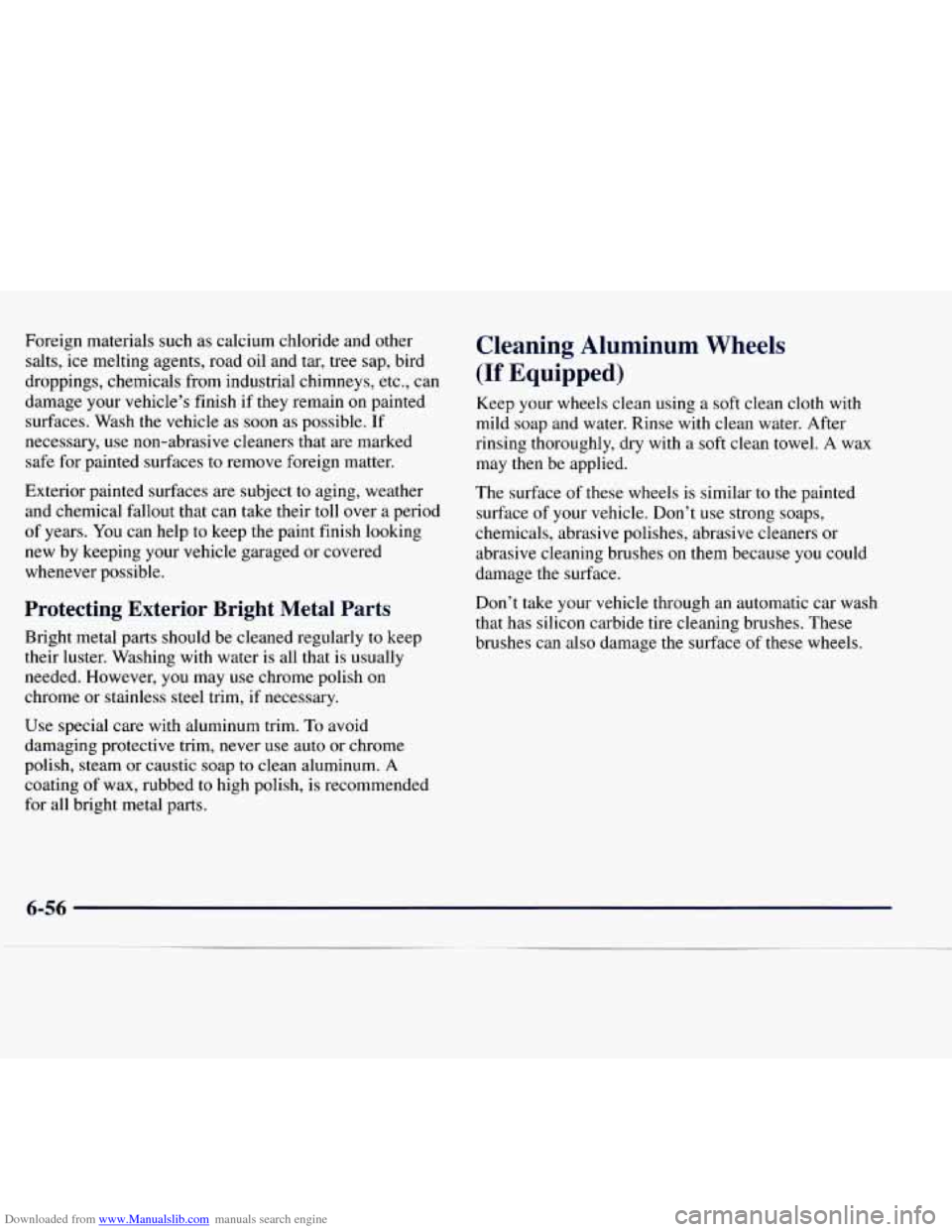
Downloaded from www.Manualslib.com manuals search engine Foreign materials such as calcium chloride and other
salts, ice melting agents, road oil and tar, tree sap, bird
droppings, chemicals from industrial chimneys, etc., can
damage your vehicle’s finish if they remain on painted
surfaces. Wash the vehicle as soon as possible. If
necessary,
use non-abrasive cleaners that are marked
safe for painted surfaces to remove foreign matter.
Exterior painted surfaces are subject to aging, weather
and chemical fallout that can take their toll over
a period
of years. You can help to keep the paint finish looking
new by keeping your vehicle garaged or covered
whenever possible.
Protecting Exterior Bright Metal Parts
Bright metal parts should be cleaned regularly to keep
their luster. Washing with water is all that is usually
needed. However, you may use chrome polish on
chrome or stainless steel trim, if necessary.
Use special care with aluminum trim.
To avoid
damaging protective trim, never use auto or chrome
polish, steam or caustic soap
to clean aluminum. A
coating of wax, rubbed to high polish, is recommended
for all bright metal parts.
Cleaning Aluminum Wheels
(If Equipped)
Keep your wheels clean using a soft clean cloth with
mild soap and water. Rinse with clean water. After
rinsing thoroughly, dry with a soft clean towel. A wax
may then be applied.
The surface
of these wheels is similar to the painted
surface of your vehicle. Don’t use strong soaps,
chemicals, abrasive polishes, abrasive cleaners or
abrasive cleaning brushes on them because you could
damage the surface.
Don’t take your vehicle through an automatic car wash
that has silicon carbide tire cleaning brushes. These
brushes can also damage the surface of these wheels.
Page 296 of 386
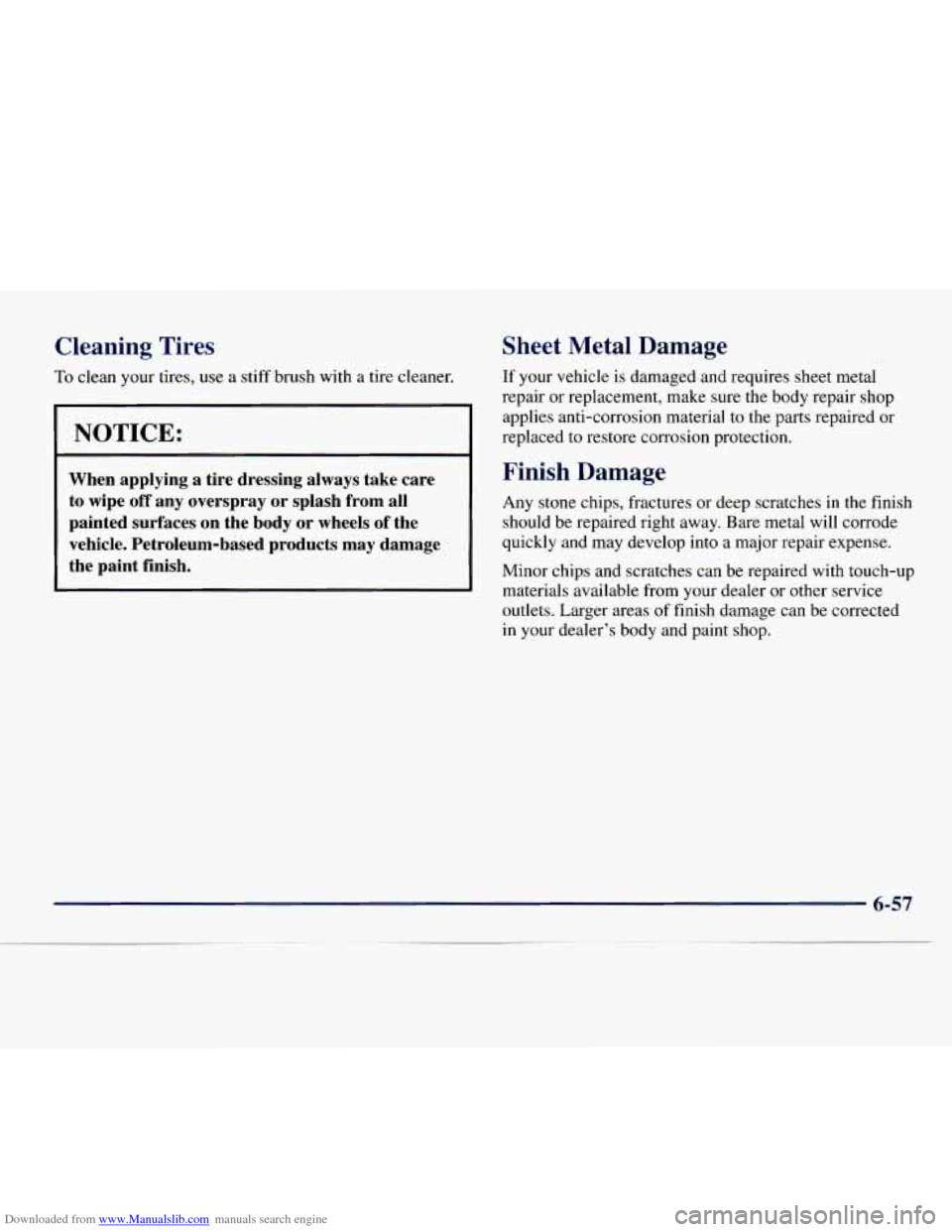
Downloaded from www.Manualslib.com manuals search engine Cleaning Tires
To clean your tires, use a stiff brush with a tire cleaner.
NOTICE:
When applying a tire dressing always take care
to wipe
off any overspray or splash from all
painted surfaces on the body or wheels of the
vehicle. Petroleum-based products may damage
the paint finish.
Sheet Metal Damage
If your vehicle is damaged and requires sheet metal
repair or replacement, make sure the body repair shop
applies anti-corrosion material to the parts repaired or
replaced to restore corrosion protection.
Finish Damage
Any stone chips, fractures or deep scratches in the finish
should be repaired right away. Bare metal will corrode
quickly and may develop into a major repair expense.
Minor chips and scratches can be repaired with touch-up
materials available from your dealer or other service
outlets. Larger areas of finish damage can be corrected
in your dealer’s body and paint shop.
Page 298 of 386
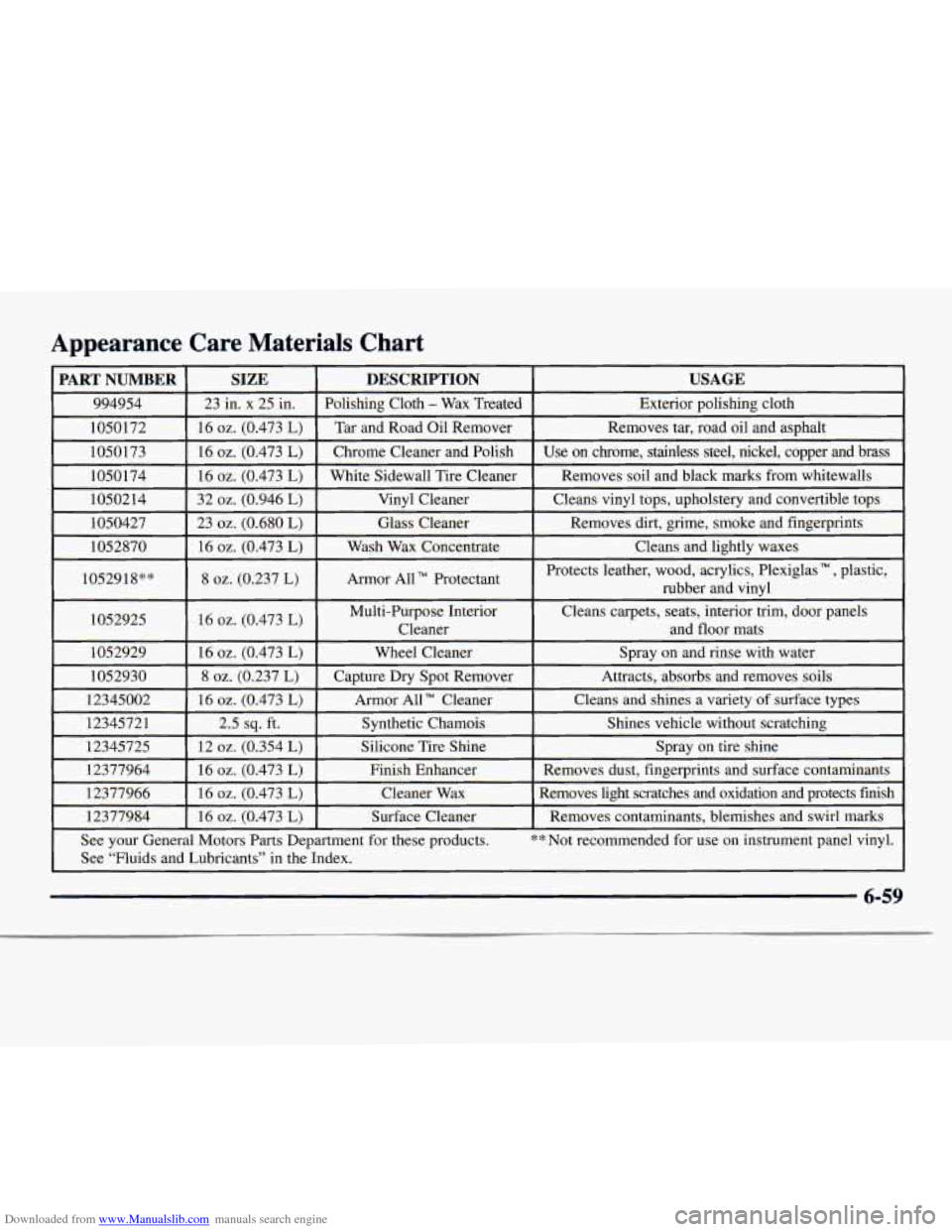
Downloaded from www.Manualslib.com manuals search engine Care Materials Chart
Appearance
PART NUMBER
994954
1050172
1050173 1050 174
10502
14
1050427
1052870
1052918**
1052925 1052929
1052930
12345002
12345721
12345725
12377964
12377966
12377984
SIZE
23 in. x 25 in.
16
oz. (0.473 L)
16 oz. (0.473 L)
16 02. (0.473 L)
32
02. (0.946 L)
23
oz. (0.680 L)
16 oz. (0.473 L)
8 oz. (0.237 L)
16 oz. (0.473 L)
16 oz. (0.473 L)
8 02. (0.237 L)
16 02. (0.473 L)
2.5 sq. ft.
12
oz. (0.354 L)
16 02. (0.473 L)
16 02. (0.473 L)
16 02. (0.473 L)
DESCRIPTION
Exterior polishing cloth
Polishing Cloth - Wax
Treated
USAGE
Tar and Road Oil Remover
Removes soil and black marks from whitewalls
White Sidewall Tire Cleaner Use on chrome, stainless steel, nickel, copper and brass Chrome\
Cleaner and Polish Removes
tar, road oil and asphalt
Vinyl Cleaner
Removes dirt, grime, smoke and fingerprints
Glass Cleaner Cleans
vinyl tops, upholstery and convertible tops
Wash Wax Concentrate Cleans
and lightly waxes
-
Armor All Protectant Protects
leather, wood, acrylics, Plexiglas N, plastic,
rubber and vinyl
..___
Multi-Purpose Interior
Cleans carpets, seats, interior trim, door panels
Cleaner and floor mats
Wheel Cleaner Spray on and rinse with water
Capture Dry Spot Remover
Attracts, absorbs and removes soils
Armor All Cleaner Cleans and shines
a
variety of surface types
Synthetic Chamois
Spray on tire shine
Silicone Tire Shine Shines vehicle
without scratching
Finish Enhancer
Removes light scratches and oxidation and protects finish
Cleaner
Wax Removes dust, fingerprints
and surface contaminants
Surface Cleaner Removes contaminants, blemishes and swirl marks
See your General Motors Parts Department for these products.
** Not recommended for use on instrument panel vinyl.
See “Fluids and Lubricants’’ in the Index.
6-59
Page 306 of 386
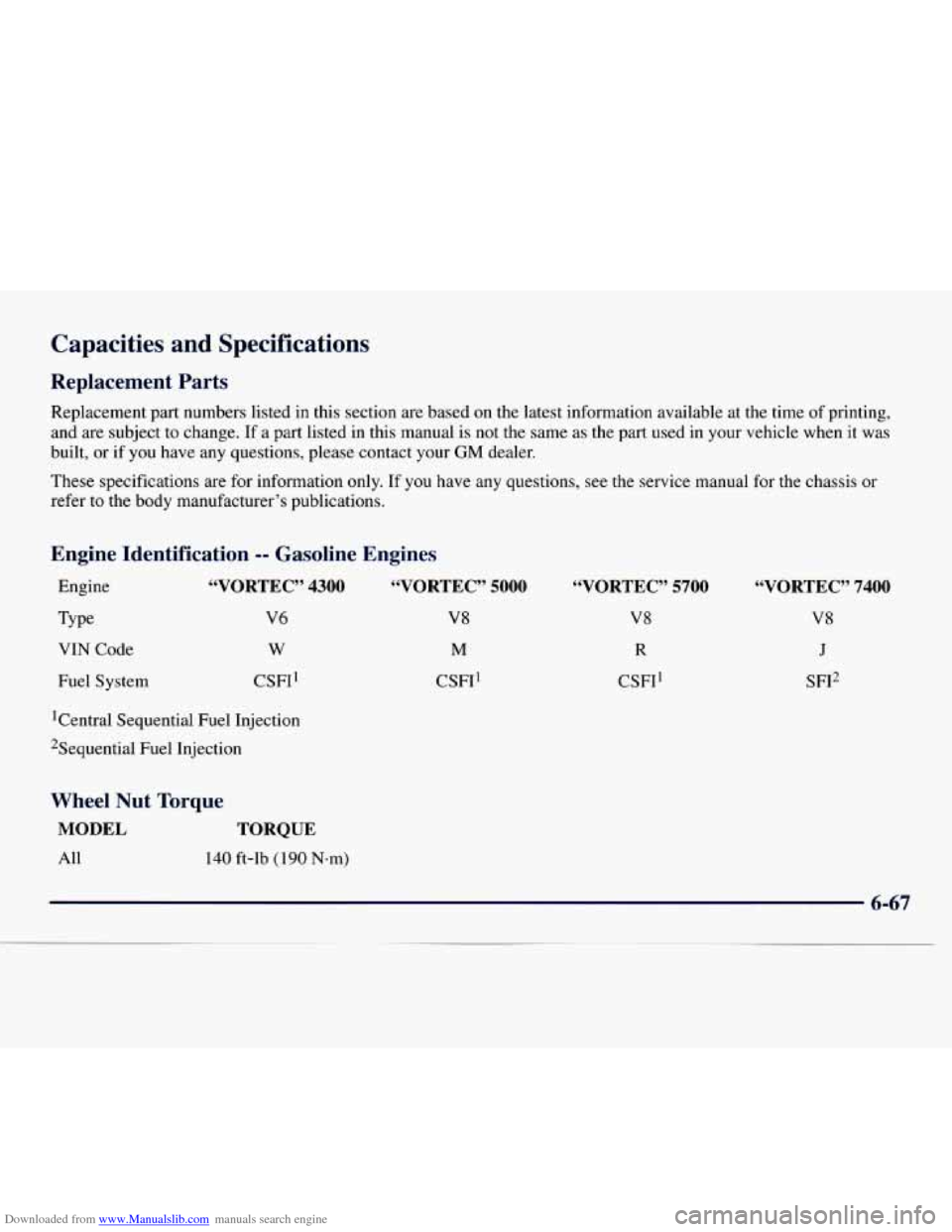
Downloaded from www.Manualslib.com manuals search engine Capacities and Specifications
Replacement Parts
Replacement part numbers listed in this section are based on the latest information available at the time of printing,
and are subject to change. If a part listed in this manual is not the same as the part used
in your vehicle when it was
built, or
if you have any questions, please contact your GM dealer.
These specifications are for information only. If you have any questions, see the service manual for the chassis or
refer to the body manufacturer’s publications.
Engine Identification -- Gasoline Engines
Engine “VORTEC” 4300 “VORTEC” 5000
Type V6 V8
VIN Code w M
Fuel System CSFI’ CSFI 1
lCentra1 Sequential Fuel Injection
2Sequential Fuel Injection
Wheel Nut Torque
MODEL TORQUE
All 140 ft-lb (190 Nem)
“VORTEC” 5700
V8
R
CSFI’
“VORTEC” 7400
V8
J
SFI~
Page 308 of 386

Downloaded from www.Manualslib.com manuals search engine Fuel Tank Capacity (Approximate)
TYPE QUANTITY
Standard Tank 31 Gallons (117.33 L)
Standard Tank 33 Gallons (124.90 L)
Optional Tank* 55 Gallons (208.18 L)
** 159”, 177” Wheelbase Vehicles Only.
MODEL TYPE
Passenger and Cargo
Cab and Chassis
Cab and Chassis
Normal Maintenance Replacement Parts
Engine “VORTEC”4300 “VORTEC”5000
VIN W M
Oil Filter PF52 PF1218
Air Cleaner Filter
* A917C A9 17C
PCV Valve CV789C cv774c
Spark
Plugs 4 1-932 4 1-932
Fuel Filter GF48
1 GF48 1
Radiator Cap RC36 RC36
“VORTEC”5700
R
PF1218
A917C
cv774c 4 1-932
GF48
1
RC36
“VORTEC”7400
J
PF1218 A917C
cv774c 4 1-932
GF48
1
RC36
* Replace with AC Air Filter, Part No. A917C and for severe dusty conditions, use AC Air Filter, Part No. 1236C.
Page 316 of 386
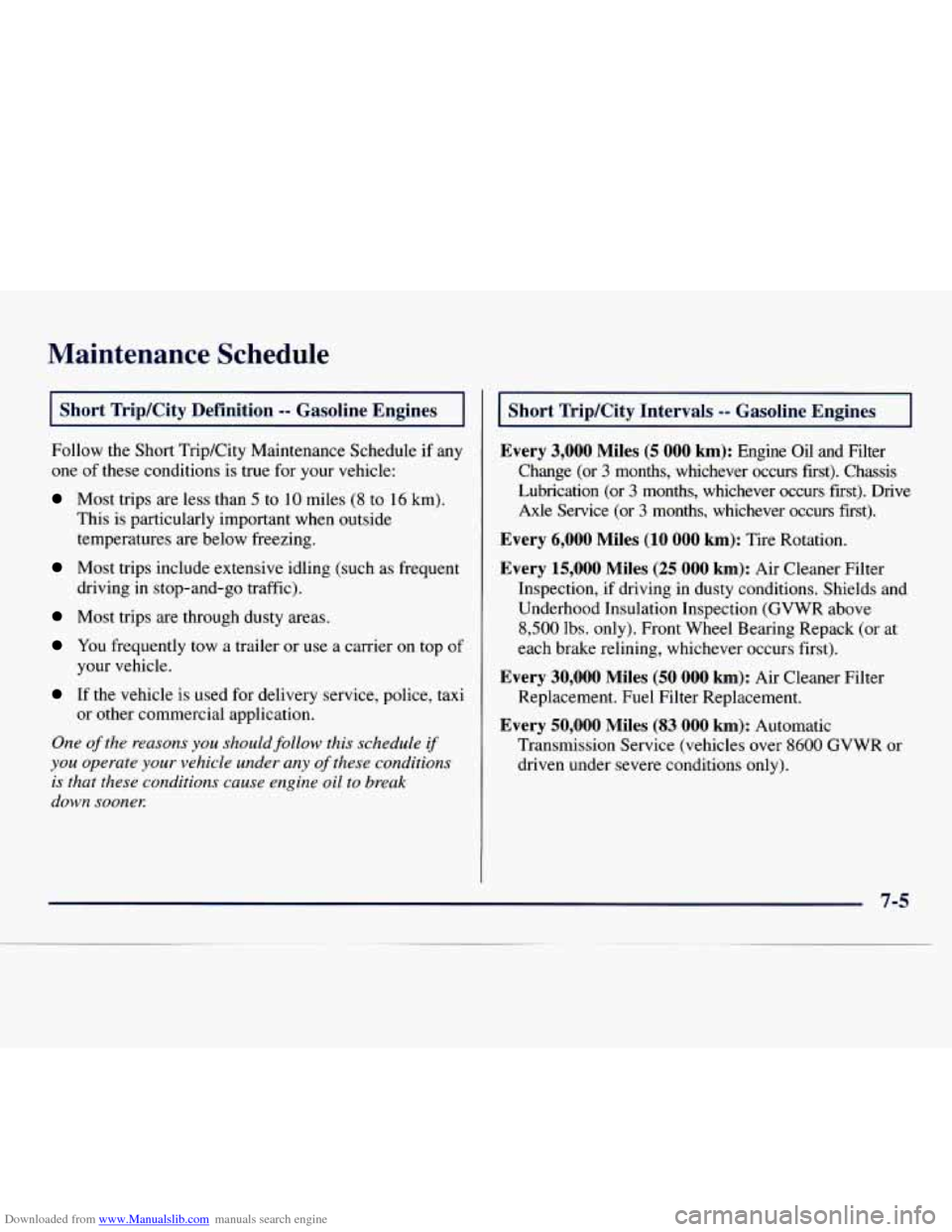
Downloaded from www.Manualslib.com manuals search engine Maintenance Schedule
Short Trip/City Definition -- Gasoline Engines
Follow the Short Trip/City Maintenance Schedule if any
one of these conditions is true for your vehicle:
Most trips are less than 5 to 10 miles (8 to 16 km).
This is particularly important when outside
temperatures are below freezing.
Most trips include extensive idling (such as frequent
driving
in stop-and-go traffic).
Most trips are through dusty areas.
You frequently tow a trailer or use a carrier on top of
If the vehicle is used for delivery service, police, taxi
One of the reasons you should follow this schedule if
you operate your vehicle under any of these conditions
is that these conditions cause engine oil
to break
down sooner:
your vehicle.
or other commercial application.
Short Trip/City Intervals -- Gasoline Engines
Every
3,000 Miles (5 000 km): Engine Oil and Filter
Change (or
3 months, whichever occurs first). Chassis
Lubrication (or
3 months, whichever occurs first). Drive
Axle Service (or
3 months, whichever occurs first).
Every 6,000 Miles (10 000 km): Tire Rotation.
Every 15,000 Miles (25 000 km): Air Cleaner Filter
Inspection, if driving in dusty conditions. Shields and
Underhood Insulation Inspection (GVWR above
8,500 lbs. only). Front Wheel Bearing Repack (or at
each brake relining, whichever occurs first).
Every 30,000 Miles (50 000 km): Air Cleaner Filter
Replacement. Fuel Filter Replacement.
Every 50,000 Miles (83 000 km): Automatic
Transmission Service (vehicles over
8600 GVWR or
driven under severe conditions only).
7-5
Page 318 of 386
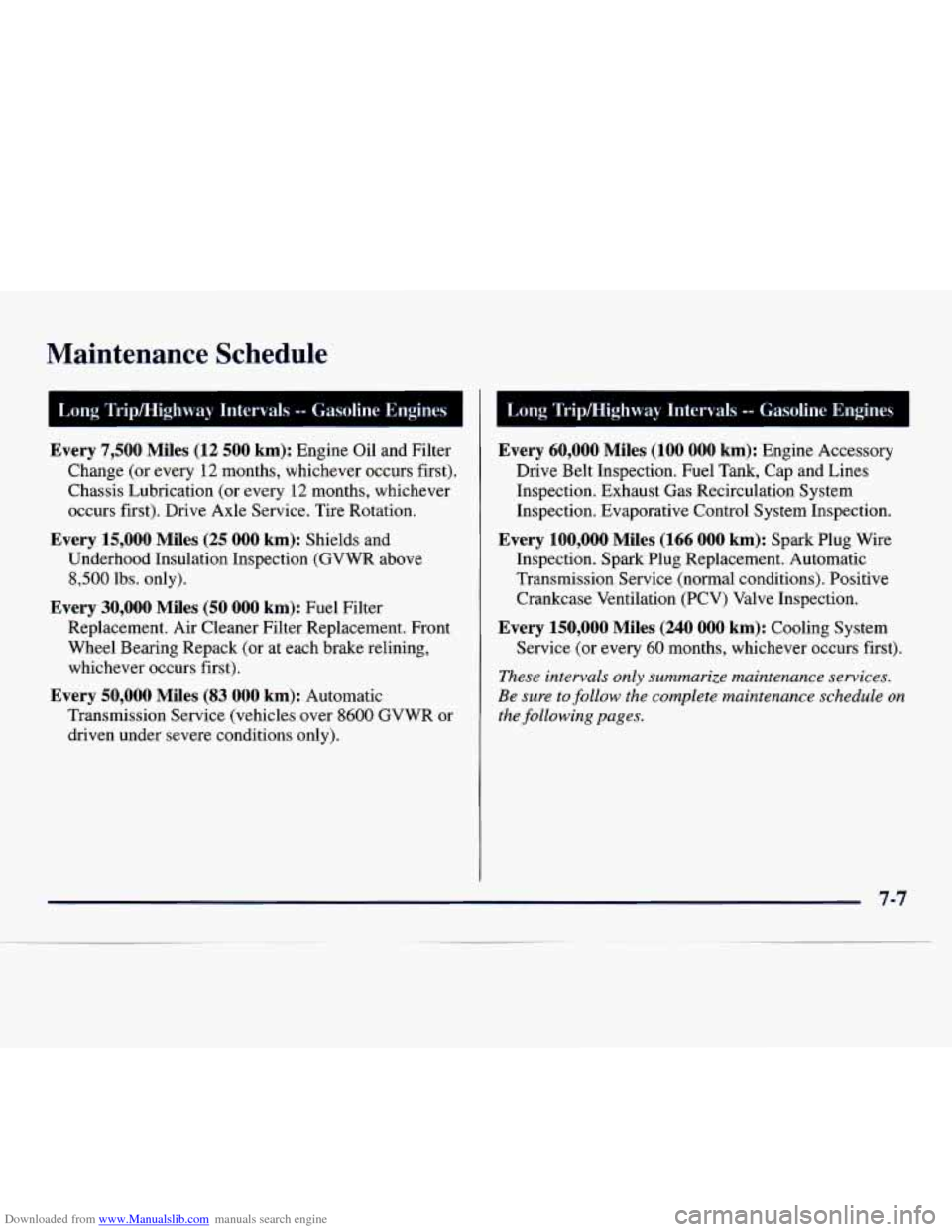
Downloaded from www.Manualslib.com manuals search engine Maintenance Schedule
Long Tripmighway Intervals -- Gasoline Engines I
Every 7,500 Miles (12 500 km): Engine Oil and Filter
Change (or every
12 months, whichever occurs first).
Chassis Lubrication (or every 12 months, whichever
occurs first). Drive Axle Service. Tire Rotation.
Every 15,000 Miles (25 000 km): Shields and
Underhood Insulation Inspection (GVWR above
8,500 lbs. only).
Replacement. Air Cleaner Filter Replacement. Front
Wheel Bearing Repack (or at each brake relining,
whichever occurs first).
Transmission Service (vehicles over
8600 GVWR or
driven under severe conditions only).
Every 30,000 Miles (50 000 km): Fuel Filter
Every 50,000 Miles (83 000 km): Automatic
Long Tripmighway Intervals -- Gasoline Engines
Every
60,000 Miles (100 000 km): Engine Accessory
Drive Belt Inspection. Fuel Tank, Cap and Lines
Inspection. Exhaust Gas Recirculation System
Inspection. Evaporative Control System Inspection.
Every 100,000 Miles (166 000 km): Spark Plug Wire
Inspection. Spark Plug Replacement. Automatic
Transmission Service (normal conditions). Positive
Crankcase Ventilation (PCV) Valve Inspection.
Every 150,000 Miles (240 000 km): Cooling System
Service (or every
60 months, whichever occurs first).
These intervals only summarize maintenance services.
Be sure
to follow the complete maintenance schedule on
the following pages.
7-7
Page 322 of 386

Downloaded from www.Manualslib.com manuals search engine I Short TripKity Maintenance Schedule -- Gasoline Engines I
0 Clean and repack the front wheel bearings (or at each brake relining,
whichever occurs first).
0 Vehicles With GVWR Above 8,500 lbs. Only: Inspect shields and underhood
insulation for damage or looseness. Adjust or replace as required.
This is a
Noise Emission Control Service. Applicable only
to vehicles sold in the
United States.
18,000 Miles (30 000 km)
0 Change engine oil and filter (or every 3 months, whichever occurs first).
An Emission Control Service.
0 Lubricate chassis components (or every 3 months, whichever occurs first).
0 Check axle fluid level and add fluid as needed. (See footnote **.)
0 Rotate tires. See “Tire Inspection and Rotation” in the Index for proper
rotation pattern and additional information. (See footnote
+.)
(See footnote #.)
21,000 Miles (35 000 km)
Change engine oil and filter (or every 3 months, whichever occurs first).
0 Lubricate chassis components (or every 3 months, whichever occurs first).
0 Check axle fluid level and add fluid as needed. (See footnote **.)
An Emission Control Service.
(See footnote #.)
DATE I
MILEAGE ACTUAL I SERVICEDBY I
DATE I
SERVICED BY:
1
7-11